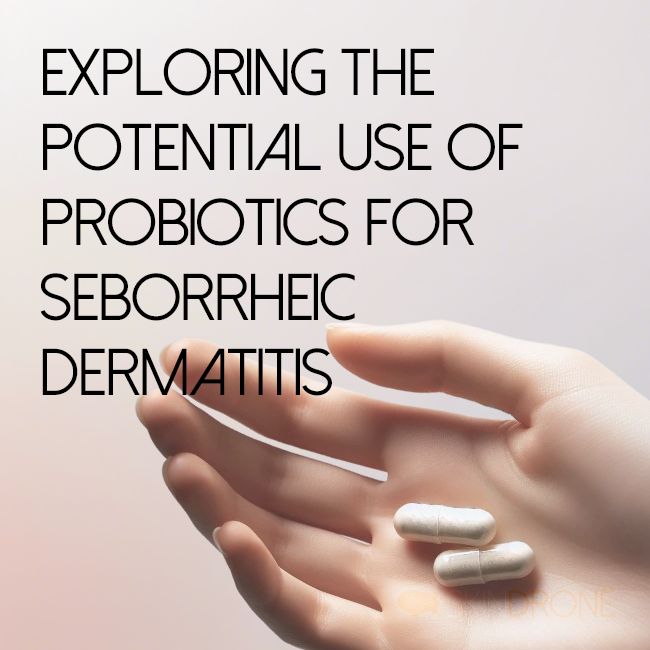- Red, itchy, flaky skin got you down? Seborrheic dermatitis is a common condition, and probiotics might offer a new approach.
- Beyond creams and shampoos: Discover how probiotics, both topical and oral, could complement your seborrheic dermatitis treatment.
- Gut-skin connection: Learn about the fascinating link between your gut, skin microbiome, and inflammatory skin conditions.
Seborrheic dermatitis is a widespread inflammatory skin condition recognized by red, itchy, and flaky skin. Scalp involvement is most frequent, but it can also appear on the face, chest, back, and other body areas. Symptoms tend to flare and subside, and management typically involves medicated shampoos, creams, and dermatologist-prescribed treatments.
Probiotics, live microorganisms offering health benefits when consumed, are gaining attention. They work to maintain a healthy balance within the gut and skin microbiomes. Current research is investigating probiotics as a potential complementary therapy for seborrheic dermatitis and other inflammatory skin conditions.

Understanding Seborrheic Dermatitis: The Complex Causes
The precise origins of seborrheic dermatitis remain unclear, but it’s likely a mix of several contributing factors:
- Malassezia Yeast: This naturally occurring skin yeast can become problematic. An overgrowth, fueled by skin oils, may lead to irritation and inflammation.
- Immune Response: Inflammation is a key component. An unusual immune system reaction to Malassezia and other skin microbes could be involved.
- Genetic Predisposition: Seborrheic dermatitis often runs in families, suggesting a genetic link.
- Stress and Mood: Flare-ups are often linked to stress, depression, fatigue, and mood shifts, highlighting the complex brain-skin connection.
- Environmental Factors: Cold, dry weather and excessively oily skin can worsen symptoms.
- Associated Conditions: Existing skin conditions like acne, psoriasis, and blepharitis are linked to a higher risk, though the exact nature of this link is still under investigation.

Probiotics: A Potential Solution? How They Might Help
Researchers are exploring probiotics to target the root causes of seborrheic dermatitis:
Rebalancing Your Skin Microbiome
- Your skin microbiome is a community of bacteria, fungi, and other microorganisms. An imbalance, particularly Malassezia overgrowth, may trigger inflammation in seborrheic dermatitis.
- Probiotics to the Rescue: Probiotics introduce beneficial microorganisms that could restore balance and control yeast overgrowth [1]. Certain probiotic strains produce antimicrobial substances that fight pathogens like Malassezia [2].
Inflammation Regulation
- Chronic inflammation is a hallmark of seborrheic dermatitis, potentially stemming from immune system issues or microbiome imbalances.
- Probiotics to the Rescue: Probiotics are known to regulate gut inflammation and show promise in controlling systemic and skin inflammation [3].
Boosting Skin Barrier Function
- A compromised skin barrier can lead to moisture loss and irritation in seborrheic dermatitis.
- Probiotics to the Rescue: Topical probiotics have demonstrated the ability to strengthen skin barrier function, improve hydration, and reduce skin sensitivity [4].
Mental Well-being Support
- Mental health and stress are strongly linked to seborrheic dermatitis flares, although the exact mechanisms are still being explored.
- Probiotics to the Rescue: Early studies suggest some probiotic strains may ease anxiety, depression, and stress – all factors that can exacerbate seborrheic dermatitis [5].

Probiotics for Seborrheic Dermatitis: Promising Benefits
Emerging research points to potential benefits of probiotics in managing seborrheic dermatitis:
- Topical Probiotics Show Promise: Small studies indicate topical probiotics can improve symptoms of atopic dermatitis [6], suggesting potential for similar benefits in seborrheic dermatitis.
- Success in Related Skin Conditions: Probiotic supplements and foods have shown effectiveness in treating other inflammatory skin conditions like eczema, acne, and psoriasis [7].
- Positive User Experiences with Probiotic Skincare: Probiotic skincare products are gaining popularity, with users reporting better skin hydration, reduced sensitivity, and increased comfort.
- Self-Reported Improvements: Individuals using probiotic foods or supplements often report fewer and milder seborrheic dermatitis flare-ups.
- Sebum Regulation Potential: Some research suggests probiotics might help regulate sebum production, reducing skin oiliness and improving acne [8]. Managing sebum is relevant to seborrheic dermatitis.
- Inflammation Reduction: Early studies show certain probiotics can lower markers of systemic inflammation [9], which is linked to seborrheic dermatitis.
- Mood Improvement: Small studies indicate probiotic supplements may improve depressive symptoms and anxiety [10], potentially lessening stress-related flares.
While these findings are encouraging, more extensive research is needed to fully understand how probiotics can benefit seborrheic dermatitis. However, current evidence suggests they hold promise as a complementary therapy.

Integrating Probiotics: Supplements and Foods
Considering probiotics for seborrheic dermatitis? Here’s how to approach it:
- Dermatologist Consultation is Key: Discuss probiotics with your dermatologist to see if they are suitable for you and get personalized recommendations.
- Choose Reputable Brands: Opt for well-researched strains from established supplement companies.
- Explore Different Strains: Probiotic effects vary significantly between strains and species.
- Combine with Prebiotics: Prebiotics act as food for probiotics, supporting their growth and colonization.
- Incorporate Probiotic Foods: Kefir, yogurt, sauerkraut, and other fermented foods are excellent probiotic sources.
- Check CFU Count: Choose supplements with at least 1 billion CFUs (colony-forming units) per serving, indicating live active cultures.
- Consistency is Important: Daily intake appears necessary to experience the benefits of probiotics.
![Image showing a variety of probiotics with the heading: Discover the power of probiotics][1]

Topical Probiotic Skincare: Direct Skin Application
Topical probiotic skincare offers another way to introduce beneficial microbes, with products like:
- Probiotic Creams/Serums: Apply directly to affected areas, choosing hydrating formulas.
- Probiotic Cleansing Oils: Gently cleanse while delivering beneficial microbes.
- Probiotic Moisturizers: Hydrate and soothe, improving skin barrier function.
- Probiotic Masks: Weekly treatments for a concentrated probiotic boost.
- Probiotic Shampoos: Aim to balance yeast and bacteria on the scalp.
For topical products, look for well-studied probiotic strains known to benefit skin, such as Lactobacillus and Bifidobacterium. Introduce new products gradually and discontinue if irritation occurs.
![Various Topical Probiotic Skincare Products][2]

A Holistic Approach: Probiotics as Part of Your Seborrheic Dermatitis Plan
Probiotics are not a replacement for prescribed medical treatments. They are best considered a complementary approach to support your existing seborrheic dermatitis management plan.
A comprehensive strategy may include:
- Prescribed Medications: Continue using medicated shampoos and topical treatments as directed.
- Oral Medications: Take prescribed or over-the-counter oral medications as needed.
- Professional Treatments: Consult your dermatologist for professional cleaning or treatments.
- Gentle Skincare: Use mild cleansers and moisturizers.
- Stress Reduction: Implement stress management techniques and support mental well-being through lifestyle changes.
- Dietary Considerations: Explore dietary modifications to support skin and microbiome health.
- Probiotics and Supplements: Consider probiotics and other supplements as complementary therapies.
Adopting a holistic approach to seborrheic dermatitis, including probiotics, can contribute to healthier skin and potentially reduce flare-ups. Remember that individual responses vary, and finding the optimal combination of treatments and lifestyle adjustments may require some experimentation.

Additional Complementary Therapies
Beyond probiotics, other complementary therapies may offer relief from seborrheic dermatitis symptoms:
- Tea Tree Oil: Topical application of diluted tea tree oil may help reduce scaling and irritation due to its anti-inflammatory and antimicrobial properties.
- Aloe Vera: Pure aloe vera gel can soothe and reduce inflammation when applied to the skin.
- Omega-3 Fatty Acids: Found in fish, walnuts, and flaxseeds, omega-3s may help calm inflammation.
- Vitamin D: Supplementation may be beneficial, as deficiency is common in seborrheic dermatitis patients and vitamin D plays a role in immune regulation.
- Stress Management Techniques: Practices like meditation, yoga, or counseling can help manage stress-related flares.
- Probiotic-Rich Foods: Incorporate yogurt, kefir, kimchi, sauerkraut, and other fermented foods into your diet.
- Prebiotic Fiber: Increase intake of prebiotic fiber from vegetables, fruits, whole grains, and beans to nourish beneficial gut bacteria.
- Healthy Lifestyle: Maintain a healthy diet, exercise regularly, stay hydrated, and prioritize sleep.
Always consult your dermatologist before making significant changes to your seborrheic dermatitis treatment. While incorporating probiotics and dietary adjustments can be reasonable, never alter or discontinue prescription medications without professional medical advice.
![Gentle Solutions for Seborrheic Dermatitis – Skin Care Products][3]

The Takeaway
Early research suggests probiotics hold promise as a valuable complementary therapy for seborrheic dermatitis. They may positively influence key factors like microbiome balance, inflammation control, skin barrier function, and even mental well-being.
Both oral and topical probiotics show potential, particularly for inflammation-driven skin conditions. However, larger, more robust studies are still needed to solidify these findings.
Probiotics should not replace conventional medical treatments. However, when integrated into a holistic approach encompassing lifestyle factors, probiotics may offer added benefits for managing persistent seborrheic dermatitis.
Always discuss any treatment changes with your dermatologist. Probiotics are a promising complementary option worth exploring at your next appointment.

No Comments
Be the first to start a conversation